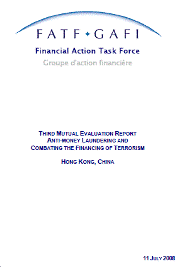The Financial Action Task Force (FATF) has completed an assessment of the implementation of anti-money laundering and counter-terrorist financing (AML/CFT) standards in Hong Kong, China (hereinafter Hong Kong). Among its major findings were:
- Hong Kong has a good legal structure to combat money laundering (ML) and terrorist financing (TF). The ML offence is broad and almost fully meets the FATF requirements. It is well prosecuted with a satisfactory conviction rate. The TF offence does not cover provision/collection for an individual terrorist or terrorist organisation. In addition, the offence applies to ‘funds’ but not non-financial assets and does not extend to terrorism directed towards international organisations. Terrorist funds have not been detected in Hong Kong and there have been no prosecutions for TF.
- While Hong Kong has a fairly comprehensive criminal confiscation regime, these measures are not available in all cases, do not extend to all predicate offences and the number of confiscations is relatively low. Legislative provisions enacted for confiscation of the proceeds of TF are not yet in force.
- The Joint Financial Intelligence Unit (JFIU), Hong Kong’s financial intelligence unit, is effective and is the focal point for Hong Kong’s law enforcement efforts to combat ML and TF. It and other competent authorities have been designated responsibility for investigation and prosecution of ML and TF offences.
- The preventive system addresses customer identification and other AML/CFT obligations and applies to a range of financial institutions and some designated non-financial businesses and professions (DNFBPs). There are limited requirements in place for non-core financial institutions. A number of the AML/CFT obligations exist only in mandatory guidelines issued by the regulatory authorities which are generally comprehensive and constitute other enforceable means. The preventive system for some non-core financial institutions does not incorporate adequate customer due diligence requirements with respect to politically exposed persons.
- While the volume of suspicious transaction reports (STRs) has increased in recent years, the submission of STRs by DNFBPs could be improved. Sound requirements as to internal controls and compliance functions are in place for core financial institutions (banking, securities and insurance).
- Supervision is effective for the banking, insurance and securities sectors, but weak or non-existent for many types of DNFBPs. The range of sanctions available for AML/CFT breaches is broad for core financial institutions other than insurance and is appropriately employed by the supervisory authorities.
- Hong Kong offers a wide range of mutual legal assistance. The extradition regime is uncomplicated and not subject to unreasonable grounds for refusal. Authorities provide a wide range of international co-operation to their foreign counterparts and have effective gateways to facilitate prompt and constructive exchange of information.
For further information, journalists are invited to contact the FATF Secretariat (tel: +33 1 45 24 79 45, fax: +33 1 44 30 61 37, email: contact@fatf-gafi.org); 2, rue André-Pascal, 75775 Paris Cedex 16, FRANCE.
This mutual evaluation was conducted using the FATF Recommendations as published in October 2004, and the 2004 Methodology for Assessing Compliance with the FATF 40 Recommendations and FATF 9 Special Recommendations.


 Twitter
Twitter
 Facebook
Facebook
 Instagram
Instagram
 Linkedin
Linkedin
